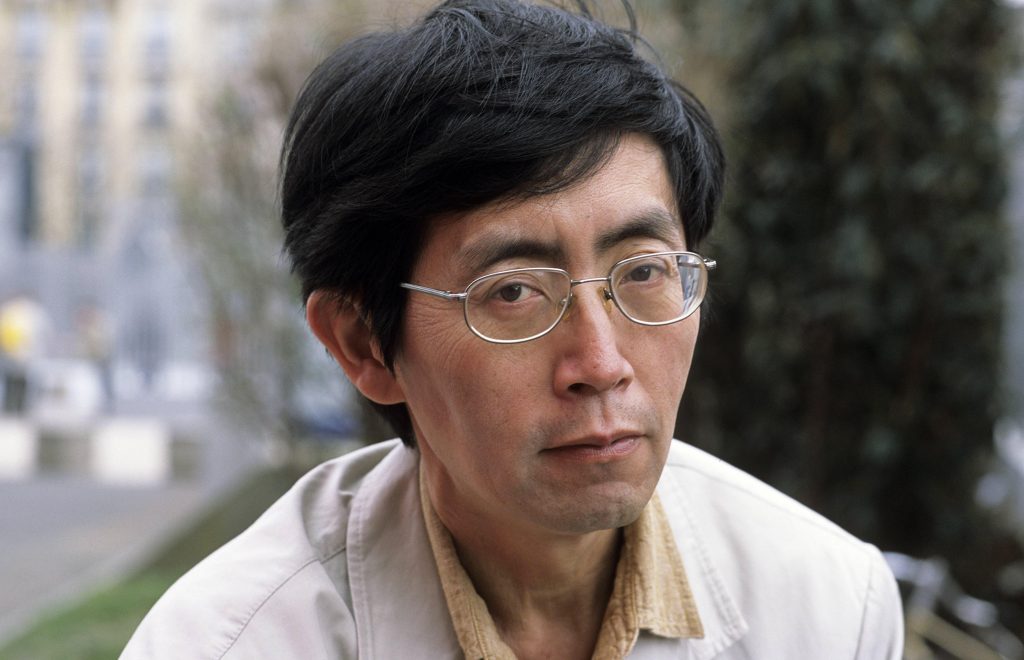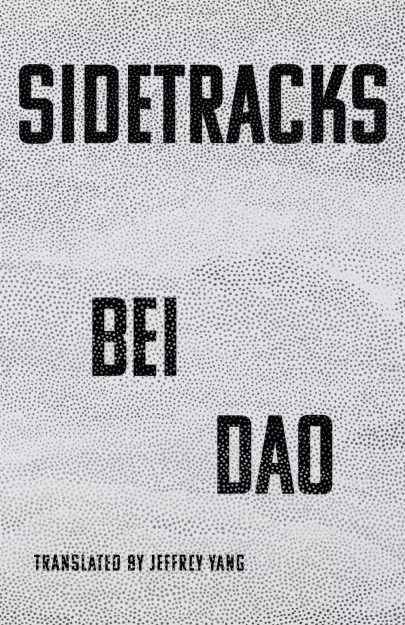“As a poet, I am always lost,” poet Bei Dao once said. Born in Beijing in 1949 just two months before the official establishment of the People’s Republic of China, the poet has witnessed many cycles of political tumult and dislocation in his lifetime, culminating in his own exile from and eventual return to his homeland. Sidetracks, his new book-length poem that has been eleven years in the making, documents his wandering and reminiscences through nearly four decades of exile in thirty-four hazy, dreamlike cantos.
Riffing on classical Chinese poetic traditions and interpolating Buddhist scripture and Beat poetry, Sidetracks mimics the dislocation of exile in its very structure, with abrupt transitions and sudden, unexpected juxtapositions between decades and continents. Sprawling, lyrical, and often ambiguous, the cantos follow the poet’s journeys through history and memory, chronicling the many divergent paths his life has taken, including his recollections of the Cultural Revolution; his friendships with Allen Ginsberg, Gary Snyder, and Eliot Weinberger and their forays into Buddhist teachings and practice; and his recovery from a debilitating stroke. In one poem, Allen Ginsberg teaches him to meditate on a sidewalk in Seoul; in another, he returns to Beijing for the first time in thirteen years and finds his country—and himself—utterly changed (“the century cracks / and the mother tongue has deepened my foreignness”).
While much of his work conveys a fierce sense of political urgency (as he writes, “revolt gives poetry an inexhaustible locomotive”), in recent years this urgency has become physical as well. In 2012 Dao suffered a stroke that inhibited his ability to speak and write, causing him to shelve the project as his daughter taught him his native tongue with beginners’ flashcards. Three years later he began writing again, “stumbling along, wobbling like a rusty pendulum, searching for that innate, inner compulsion.” The unpredictable recovery process, combined with his experience living in Hong Kong during the COVID-19 pandemic, caused him to become more acutely aware of the Buddhist concept of anitya, or impermanence—“that what encompasses life and energy, along with the creative faculties, could be cut short or recede at any moment.” This attunement to impermanence lends Sidetracks a thrumming vibrancy, as Dao seeks new language to convey what cannot be expressed—and what might be taken away at any moment.
–Sarah Fleming
XXXIII.
as if the steelyard’s landing stage suddenly tilted pleasure boats
disperse a ruckus of birds the loudspeaker of the sun has been
amplified the shady boulevard keeps up with the god of death
hail a taxi from another world emergency fire exit sign white
angels wearing large masks float like clouds follow the corridor
to the end of the world order what is your name abducted by
the translucent devilfish
endless night lift the weight of the language stone waking up
to an ice rink on the ceiling the two clowns who mime the days
chase each other sounds of home lie fat on the distant haystack
a herd of horses breaks through death’s fenceline I text my teach-
ing assistant—garbled signs babble babble blubble burble
I begin to learn Chinese all over again my daughter teaches me
with learn-to-read flash cards working through many common
grade school grammatical mistakes
the speech-language pathologist’s assessment is correct I’m
really ready to deliver pizza on the heels of the madman who
steps on the musical scale a flash of sunlight—I stop writing
the little trail of the zipper exposes the back of night waiting to
be whipped by the Master of Memory the emperor stamps
the imperial jade seal at the end of the long scroll of mountains
and rivers
nebular ink dots on rice paper—in accord with the cosmos paint-
ing pictures makes me euphoric ink dots cluster disperse
depending on the flow of random scattering forest beyond the
borders of language good fortune depends on disaster / disaster
conceals good fortune I am aimless freedom listening
closely to the whispers of snowflakes guarding the vortex of day
and night at the center of the mysterious river
crossing the national borders of illness from Hong Kong to Nan-
ning the hands of the ancestors feel my pulse including
Zhang Zhongjing of Nanyang physician’s prescription book
of healing herbs and stone needles for cold and warmth measure
the depths of the sickness I lie on my side becoming a mountain
range chase the flame-bright hooves of the horses on the plains
needle and moxa each complement the other the nine planets
rotate in the hands of the magician of the Da dialectics is really
the truth of illness
turning back to the shore the ceaseless spindrift like an elegiac
song recharge through the meridians learn from the grand-
father of dusk and the moon’s waxing and waning—I play chess
with the god of death dawn embarks from the train station
the buffer overloaded with language grinds and screeches yang
qi-energy rises with a murmur from the ravine the forgotten
forest has reined in the wind
mountain chains and ocean waves enter the dangerous jour-
ney of the dream tree roots argue underground juicy
pomegranates explode poisonous mushrooms denounce
praises to heaven the master uses the strings of the qin to
pluck the turbulent world as the flies of wicked thoughts
spiral overhead I sit in meditation
♦
“XXXIII,” by Bei Dao, translated by Jeffrey Yang, from Sidetracks, copyright © 2022, 2023 by Zhao Zhenkai. Translation copyright © 2024 by Jeffrey Yang. Used by permission of New Directions Publishing Corp.
Thank you for subscribing to Tricycle! As a nonprofit, we depend on readers like you to keep Buddhist teachings and practices widely available.

